VANCOUVER — Local politicians in British Columbia have passed all three resolutions addressing their concerns about the rollout of drug decriminalization polices in the province, including asking for more funding to help those who are addicted and expanding prohibitions to parks and sports fields.
Delegates at the Union of BC Municipalities convention in Vancouver voted to request the province "immediately" provide funding for addiction support services such as treatment, detox, overdose prevention and safe supply on a "geographically accessible" basis.
The resolutions also include a request that the province increase annual funding to the Justice Institute of sa国际传媒 for training new officers to meet community needs.
Provincial health officer Dr. Bonnie Henry spoke to local leaders at the convention earlier this week asking for patience on the program, saying more arrests for those who use illicit drugs won't address the complex issues of addiction.
The most contentious debate during voting came around the request for the province to "further regulate the possession and use of illicit drugs" in places "where children also gather," including bus stops and beaches beyond park spaces.
The federal government gave the province approval for changes to the decriminalization program earlier this month, banning illicit drug possession within 15 metres of any structures in a playground, spray park, wading pool or skate park starting Sept. 18.
Several delegates opposed the prohibition expansion, agreeing with the provincial position that the most important aspect of decriminalization is to remove the criminal stigma from drug users, and the resolution to ask the province to expand prohibitions may damage that effort.
Langley City Mayor Nathan Pachal spoke out against the resolution, saying his community has the third largest homeless population in Metro Vancouver, and police and the courts do not enforce the rules that are already in place.
"Our experience in Langley City is you can have all the rules that say you can’t do this, but it doesn’t move the needle further to actually solving the problem," Pachal said. "If this solved the problem, we would have no problems with open substance use in our community, and we still do.
"We need to move toward ensuring that people have access to both treatment, which is lacking in Langley City, and also access to safe supply so people aren’t dying on our streets."
Port Moody councillor Haven Lurbiecki also opposed the expansion of drug-use prohibitions to parks and sports fields, saying the move would push drug users "further and further to the margins."
"Look, no one wants open substance use near children," she said. "That’s not what I’m advocating for. But, again, if we take this approach of restriction before we have the services in place, we’re simply going to see more deaths."
Other delegates were vocal in supporting the expansion of prohibitions, however.
"I think we are a little worried about safe spaces to do drugs," said Smithers councillor Frank Wray. "We have to remember that children need safe places to play, as well."
Pouce Coupe, sa国际传媒, councillor Kurtis Rabel said the existing prohibitions passed do not go far enough.
"Our communities are not an experiment," Rabel said. "These are harmful substances. Although, yes, there’s the need for rehabilitation and detox, open substance use is causing severe property problems in our communities and is tearing our communities apart."
sa国际传媒 Mental Health and Addictions Minister Jennifer Whiteside attended the convention Wednesday and said she is aware of ongoing community concerns around drug use in certain public spaces, and the province is committed to working with municipalities on solutions that support decriminalization.
"We've been consulting with communities to make sure that we can come together, make sure the objectives we have with this project work, and that we have an appropriate balance where everybody can use public space in the way that they need to," Whiteside said.
This report by The Canadian Press was first published Sept. 20, 2023.
The Canadian Press



